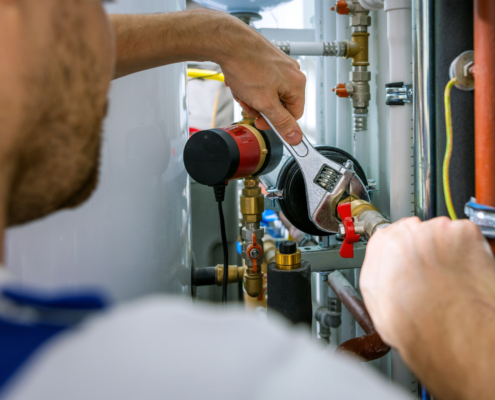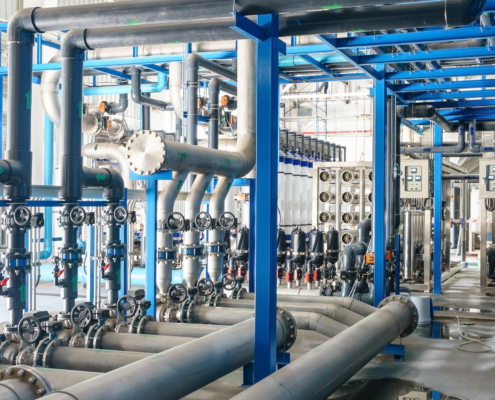 https://sammechanical.com/wp-content/uploads/2025/09/Common-Plumbing-Emergencies-And-When-to-Call-a-Professional.jpg
1250
2000
AbstraktMarketing
/wp-content/uploads/2024/01/sam-logo-crete-300x154.png
AbstraktMarketing2025-09-09 16:20:052025-09-09 16:20:09Common Plumbing Emergencies And When to Call a Professional
https://sammechanical.com/wp-content/uploads/2025/09/Common-Plumbing-Emergencies-And-When-to-Call-a-Professional.jpg
1250
2000
AbstraktMarketing
/wp-content/uploads/2024/01/sam-logo-crete-300x154.png
AbstraktMarketing2025-09-09 16:20:052025-09-09 16:20:09Common Plumbing Emergencies And When to Call a ProfessionalTop Winter Commercial Plumbing Issues and How to Prevent Them
Winter can be especially harsh on commercial plumbing systems, leading to unexpected breakdowns, costly repairs, and disruptions to your business operations. As temperatures drop, the risk of plumbing issues increases, making proactive maintenance and preparation essential. In this blog, we’ll identify the most common winter plumbing problems and offer practical solutions to keep your systems running smoothly throughout the winter months.
1. Frozen Pipes
Frozen pipes are one of winter’s most common and damaging commercial plumbing issues. When the water inside pipes freezes, it expands, increasing pressure within the pipes. This can cause pipes to crack or burst, leading to significant water damage. Frozen pipes can lead to costly repairs and downtime, but a few simple precautions can significantly reduce the risk.
- Insulate Pipes: Use pipe insulation on exposed or unheated pipes, such as those in basements, crawlspaces, or attics.
- Maintain Consistent Heat: Keep your building’s thermostat set to a consistent temperature, even during off-hours.
- Let Faucets Drip: Allow a slow trickle of water to flow from faucets connected to vulnerable pipes during extreme cold snaps.
- Seal Drafts: Check for drafts around windows, doors, and pipe entry points that could expose pipes to cold air.
2. Clogged Drains
The colder months often bring an increase in debris, grease, and other materials that can clog drains. In commercial settings, grease from kitchens or debris from higher foot traffic can accumulate quickly, leading to slow or blocked drains. Clogged drains can disrupt operations, but preventative measures ensure your commercial plumbing flows freely all winter.
- Regular Drain Cleaning: Schedule routine professional drain cleanings to prevent buildup.
- Avoid Grease Disposal: Educate staff to avoid pouring grease or oil down the sink, as it solidifies faster in colder temperatures.
- Install Drain Screens: Use drain screens in high-traffic areas to catch debris before it enters the plumbing system.
3. Water Heater Failures
Commercial water heaters work overtime in winter, and older units are particularly susceptible to breakdowns when demand spikes. Insufficient hot water can disrupt business operations, especially in hospitality, healthcare, or food services. Avoid interruptions to your hot water supply with regular inspections and proper maintenance.
- Inspect Water Heaters: Schedule a professional inspection before winter to check for leaks, sediment buildup, or worn components.
- Flush the Tank: Remove sediment buildup that reduces efficiency and can lead to failures.
- Monitor Usage: Be mindful of increased hot water demand and consider upgrading to a high-capacity or tankless water heater if necessary.
4. Burst Pipes Due to Water Pressure
When temperatures drop, water pressure in pipes can fluctuate. These pressure changes may lead to bursting pipes, especially in older plumbing systems if left unchecked. Monitoring and controlling water pressure can prevent costly bursts and leaks in your commercial plumbing system.
- Pressure Monitoring: Install a water pressure gauge and ensure it stays within a safe range (40-60 psi for most systems).
- Install Pressure Regulators: Use a pressure regulator to maintain consistent water pressure throughout your building.
- Perform Regular Inspections: Have a professional mechanical plumber inspect your pipes for weak points, cracks, or corrosion.
5. Sump Pump Failures
Snowmelt and winter rains can overwhelm sump pumps, leading to water accumulation in basements or low-lying areas. A failing sump pump can result in severe flooding and costly damages. A properly functioning sump pump is essential to avoid flooding during heavy winter precipitation.
- Test the Sump Pump: Regularly test your sump pump to ensure it activates and removes water properly.
- Install a Backup System: Consider a battery backup sump pump to keep it operational during power outages.
- Clean the Pit: Keep the sump pit free of debris to avoid clogs and ensure smooth operation.
6. Septic System Backups
Cold weather can slow down the bacterial activity in septic tanks, leading to backups. Snow and ice can also block septic system components, causing overflows. Taking care of your septic system during winter can keep it functioning and prevent inconvenient backups.
- Pump the Tank: Have your septic tank pumped before winter to prevent overloading.
- Insulate Components: Add insulation or mulch over septic tank components to protect them from freezing.
- Limit Heavy Water Use: Stagger water use to avoid overwhelming the system during winter.
7. Increased Demand on Restroom Facilities
Winter months often bring in more foot traffic due to events, holidays, or employees spending more time indoors, which can strain restroom plumbing. Increased use of restroom facilities can wear down commercial plumbing systems, so proactive inspections are crucial.
- Inspect Restrooms: Regularly inspect restrooms to ensure they’re in top working order.
- Check for Issues: Look for leaks, low water pressure, or signs of clogging in high-use fixtures.
- Schedule Maintenance: Consider scheduling additional cleaning and maintenance during peak winter months to handle the increased demand.
8. Burst Outdoor Faucets and Hoses
Outdoor faucets and hoses left attached during freezing weather can expand ice, causing faucets or connecting pipes to burst. Proper winterizing of outdoor commercial plumbing fixtures can prevent unnecessary repairs.
- Disconnect Hoses: Disconnect and drain outdoor hoses before temperatures drop.
- Shut Off Water Supply: Shut off water supply valves to outdoor faucets.
- Insulate Fixtures: Ensure any exposed fixtures are insulated or covered to protect them from freezing.
Keep your commercial plumbing systems working properly year-round by identifying and resolving every type of piping issue.
Winter Plumbing Tips to Keep Your Pipe Systems Efficient
To ensure your commercial plumbing system runs smoothly throughout the winter, adopting winter plumbing tips can make a big difference. These strategies go beyond specific issues and help maintain the overall efficiency and reliability of your system during the cold months.
1. Schedule Routine Commercial Plumbing Maintenance
Routine maintenance ensures your plumbing systems remain in peak condition throughout winter. You can address minor issues early by having a professional plumber inspect your pipes, fixtures, and water systems. This proactive approach helps you avoid disruptions, costly repairs, and downtime during the harsh winter months.
2. Monitor Indoor Humidity Levels
Low indoor humidity levels in commercial spaces can contribute to pipe contraction, leading to loosening connections and leaks. Balancing humidity with the use of humidifiers can prevent this issue. Maintaining a consistent indoor temperature also ensures pipes remain stable, reducing the risk of unnecessary plumbing damage in winter.
3. Clear Out Plumbing Spaces and Utility Rooms
Utility rooms, boiler rooms, and other commercial plumbing spaces should remain clean and clutter-free. Unblocked access makes inspections and maintenance easier while improving airflow around pipes and fixtures. Reducing clutter also minimizes moisture buildup, which can lead to rust, mold, or other damage in these critical plumbing spaces.
4. Inspect and Maintain Plumbing Insulation
While pipe insulation is essential for winter, it can wear out over time. Routine checks ensure insulation remains intact and effective in protecting pipes from freezing. Replace any worn or damaged insulation immediately and consider adding extra insulation to areas that are newly exposed to winter weather.
5. Keep Emergency Plumbing Supplies On Hand
Unexpected commercial plumbing problems can happen even with preparation. Keeping emergency supplies such as pipe repair tape, plungers, and de-icing agents on hand can minimize immediate damage. Clearly label water shut-off valves so staff can act quickly during an plumbing emergency to mitigate issues before professional help arrives.
Resolve Your Winter Commercial Plumbing Issues With SAM Mechanical Services
Winter plumbing issues can be stressful and costly, but most can be avoided with regular maintenance and proactive measures. At SAM Mechanical Services, we specialize in helping commercial properties prepare for winter with expert commercial plumbing inspections, repairs, and preventative solutions.
Don’t wait until an issue arises. Contact SAM Mechanical Services today to schedule your winter plumbing inspection and keep your business running smoothly all season long.
Share This Post
More Like This
 https://sammechanical.com/wp-content/uploads/2025/09/Common-Plumbing-Emergencies-And-When-to-Call-a-Professional.jpg
1250
2000
AbstraktMarketing
/wp-content/uploads/2024/01/sam-logo-crete-300x154.png
AbstraktMarketing2025-09-09 16:20:052025-09-09 16:20:09Common Plumbing Emergencies And When to Call a Professional
https://sammechanical.com/wp-content/uploads/2025/09/Common-Plumbing-Emergencies-And-When-to-Call-a-Professional.jpg
1250
2000
AbstraktMarketing
/wp-content/uploads/2024/01/sam-logo-crete-300x154.png
AbstraktMarketing2025-09-09 16:20:052025-09-09 16:20:09Common Plumbing Emergencies And When to Call a Professional https://sammechanical.com/wp-content/uploads/2024/10/Innovative-Commercial-Plumbing-Trends-and-Technologies-Shaping-the-Industry.jpg
1250
2000
AbstraktMarketing
/wp-content/uploads/2024/01/sam-logo-crete-300x154.png
AbstraktMarketing2024-10-24 14:10:072025-01-07 15:57:32Innovative Commercial Plumbing Trends and Technologies Shaping the Industry
https://sammechanical.com/wp-content/uploads/2024/10/Innovative-Commercial-Plumbing-Trends-and-Technologies-Shaping-the-Industry.jpg
1250
2000
AbstraktMarketing
/wp-content/uploads/2024/01/sam-logo-crete-300x154.png
AbstraktMarketing2024-10-24 14:10:072025-01-07 15:57:32Innovative Commercial Plumbing Trends and Technologies Shaping the Industry https://sammechanical.com/wp-content/uploads/2024/07/Common-Commercial-Plumbing-Issues-and-How-to-Prevent-Them.jpg
1250
2000
AbstraktMarketing
/wp-content/uploads/2024/01/sam-logo-crete-300x154.png
AbstraktMarketing2024-07-22 11:47:342025-07-28 12:03:07Common Commercial Plumbing Issues and How to Prevent Them
https://sammechanical.com/wp-content/uploads/2024/07/Common-Commercial-Plumbing-Issues-and-How-to-Prevent-Them.jpg
1250
2000
AbstraktMarketing
/wp-content/uploads/2024/01/sam-logo-crete-300x154.png
AbstraktMarketing2024-07-22 11:47:342025-07-28 12:03:07Common Commercial Plumbing Issues and How to Prevent ThemAbout
For over three decades SAM Mechanical has provided New Hampshire with the highest quality HVAC, plumbing, and mechanical services.


